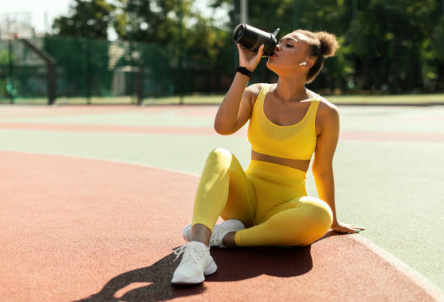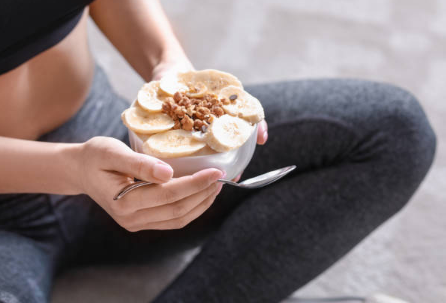Whether it’s snacking for endurance or strength training, it’s not always clear what provides the best energy for your body.
Different forms of exercise require different kinds of fuel. Getting the right nutrition can give you an edge, whether it’s competing with others or yourself.
Follow these expert guides to choose and schedule snacks that will give your workout a high level of energy.

Aerobics
If you’re doing aerobic exercise, such as hiking, cycling, or high-intensity interval training (HIIT), when to eat is just as important as what you eat.
Also, don’t forget to drink plenty of fluids before, during, and after your workout. Fluids help regulate body temperature and blood pressure, as well as transport carbohydrates, proteins, and fats, which your body uses as energy.
According to the American College of Sports Medicine, the following amounts of fluids should be drunk before, during, and after exercise:
- Before: Drink two to four milliliters per pound of body weight before your workout.
- Period: Drink water in small sips during exercise to stay hydrated. In total, aim for 0.3 to 2.4 liters of movement per hour.
- After: You need to hydrate enough to replenish the weight you lose while exercising. To find out how much weight you’ve lost, weigh yourself before and after your workout.
Fuel Up
Choose a pre-workout meal that’s rich in carbs and some protein, such as peanut butter and banana sandwiches. Carbohydrates fuel your workouts, while proteins help prepare your muscles for workouts.
Studies have found that eating at least four hours before exercise gives your body time to absorb the nutrients that provide energy during your workout.
According to a 2020 study published in the journal Nutrition, there was no major difference in exercise performance when people consumed pre-workout meals 15-75 minutes or 30-90 minutes before exercise.
However, if you exercise first thing in the morning, the American Heart Association recommends eating fruits, such as apples or bananas, about 5 to 10 minutes earlier.
Exercising with a full diet can make you feel sluggish and uncomfortable, which can hinder you from achieving your goals. If your cardio workout lasts less than an hour, then you probably don’t need to snack until then.
Recover from It
It’s important to replenish your muscles as soon as possible after a workout so that your body can maintain its energy supply. Therefore, you should prioritize carbohydrates and protein, New York dietitian Leah Kaufman told Health magazine.
Your muscles store carbohydrates and protein as energy, aiding recovery in the first hour after a workout.
“This combination of snacks will help with muscle recovery and reduce soreness,” Kaufman says. Choose something small, like a glass of chocolate milk.
A 2019 review published in the European Journal of Clinical Nutrition found that trained athletes, such as cyclists and runners, experienced slower fatigue, lower heart rate, and less energy when they drank chocolate milk during or after training than when they drank chocolate milk during or after training. Ordinary drinks. Researchers have found that chocolate milk acts similarly to sports drinks.
After your workout, you’ll also need to hydrate and replace lost electrolytes. By hydrating and balancing electrolytes, you can avoid muscle cramps and fatigue. For example, if there is an imbalance between fluid and sodium, your body can’t deliver energy properly.

Strength Training
Carbohydrates and protein help with strength training.
Carbohydrates help prevent muscle breakdown and fatigue. Meanwhile, Marie Spano, RDN, a former sports nutritionist with the Atlanta Braves and Atlanta Hawks, told Health magazine that protein helps regulate growth and repair.
Also, as with cardio, don’t forget to drink plenty of fluids before, during, and after your workout.
Fuel Up
According to a 2022 study published in the journal Nutrition, there are not enough studies to support mealtime guidance for strength training.
Still, there may be benefits to eating 15 grams of carbohydrates and 0.3 grams of protein per kilogram of body weight within three hours of your workout.
Recover from It
Protein has the healing power your body needs. When you do strength training, your muscles create tiny tears. Your body needs protein to repair these tears and strengthen muscle fibers to help your muscles adapt and grow.
Consume a post-workout meal containing about 20 grams of protein immediately after your workout. For example, whey or plant-based protein shakes and protein bars are good options.
However, check the nutrition label to make sure you’re consuming at least 20 grams of protein. Also, keep in mind that some energy bars contain a lot of sugar and carbs.
Prepare for the Game
Are you training for a 5km, 10km or marathon?

Kaufman explains:”Eating the food you plan to eat on race day will help understand how it affects your energy and stomach. ”
Fuel Up
On race day or the night before a long run, try to eat a low-fiber, low-fat, carbohydrate-rich meal. So, yes, pasta works. However, it’s unclear whether carbohydrate supplementation the night before a big game is effective, especially for women.
On the morning of the game, eat a small, carbohydrate-rich breakfast. Try a toast or fruit smoothie.
If you’re playing for less than an hour, don’t worry about having a drink on hand while running. Still, depending on the climate and your activity level, you can drink water during the race.
Conversely, for long races, you need to hydrate during the race. Also, aim to consume 30-90 grams of carbs per hour, depending on the length of your game. Energy gels are a convenient on-the-go option.
Recover from It
As with other types of exercise, you’ll need to hydrate enough to replenish the weight you lose while exercising. Also, as with other types of exercise, make sure to replenish lost electrolytes to combat muscle fatigue.
A good way to make sure your body is well hydrated is to monitor urine color. Dark-colored urine means you may be dehydrated and need more fluids. Conversely, light-colored urine means that you are well hydrated.
During intense weeks of training, drink tart cherry juice twice a day. A 2017 review published in Reports of Contemporary Sports Medicine found that tart cherry juice reduced inflammation and muscle soreness in trained athletes. In addition, researchers have found that the juice can promote muscle recovery.
However, there is no consensus on how many doses of tart cherry juice may be helpful. Still, the researchers found that the standard treatment regimen for the athletes involved in the study was 8 to 12 ounces, or 1 ounce of concentrate, twice a day. Athletes drink juice for four to five days before the competition and two to three days after the competition for recovery.
Conclusion
Eating before, during, and after your workout is key to getting the best results. Some sports, such as weightlifting, require more protein than others. Instead, you need more carbs to fuel other activities, such as endurance racing.
Choosing the right snack based on your activity and when it is active is key. Also, make sure to drink enough water and replace lost electrolytes to combat muscle fatigue, especially when doing hard, long exertions or in hot, humid environments.